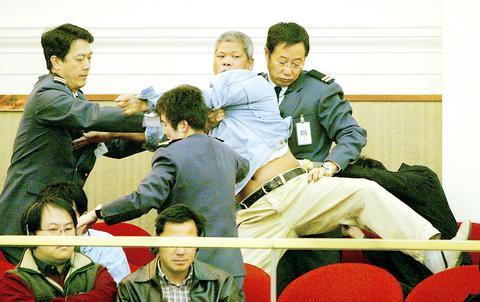Pro-democracy groups lashed out at Hong Kong's government yesterday, accusing Chief Executive Tung Chee-hwa (董建華) of kowtowing to China over political reforms and "totally disregarding" public opinion.
Campaigners demanding a swift transition to full democracy in the territory received a stinging setback on Wednesday, after Tung skirted around the issue in his annual policy address.

PHOTO: REUTERS
Tung revealed in his address that he had consulted China's rulers over any political reforms in the territory and announced the setting up of a task force charged with addressing Beijing's concerns.
The move infuriated pro-democracy campaigners, saying the decision to consult Beijing threatened Hong Kong's autonomy under its post-1997 constitution.
Lawmaker Lee Cheuk-ywan said Tung's failure to issue a timetable for reform showed he was "hopelessly out of touch" with public sentiment in Hong Kong, where hundreds of thousands of protesters have rallied in recent months.
"The speech did not offer one concrete measure to address the demands of the people who turned out on July 1 and the New Year's Day rally calling for direct elections for the chief executive and a timetable for change, not one," Lee fumed.
Tung's failure to address public demands and the confirmation that Beijing will be consulted first on reforms "shows Beijing's views are far more important than those of the public," Lee added.
China hailed Tung's address as "reliable and feasible," and took the unusual step of issuing a statement after the speech emphasizing that any changes to Hong Kong's constitution must be cleared by Beijing.
The statement drew fierce criticism from the pro-democracy camp. Democratic Party chairman Yeung Sum said the move was a huge blow and a major "snub to the wishes of the public."
"The announcement has left a black cloud hanging over constitutional reform. We can't believe Tung said the issue of whether we can or cannot have universal suffrage in Hong Kong needs to be first cleared by Beijing," Yeung said.
"That [statement] has put a brake on the move toward full democracy."
Hong Kong university analyst Sonny Lo said Tung's decision had further worsened the chief executive's credibility, who has seen his popularity plunge over the SARS crisis last year and proposed security legislation.
More than 500,000 protesters rallied last July to denounce the Beijing-backed security bill, which critics said would curtail freedoms and rights, forcing Tung to withdraw the legislation indefinitely.
"If the government consults with Beijing first on reforms, there is a real risk Hong Kong could undermine its own autonomy under `one country two systems,'" Lo said.
"Tung has to be careful not to do this ... but the government is politically sandwiched between the demands of one country and those of two systems," Lo added.
The pro-democracy camp wants the government and Beijing to commit to a firm timetable for implementing reforms.
This would include direct elections of Hong Kong's next leader by 2007 and the legislature a year later, the earliest dates permitted under the city's post-1997 constitution.
Tung, selected by an 800-member election committee loyal to Beijing, currently heads a legislature in which only 30 of the 60 seats are directly elected -- ensuring pro-government lawmakers dominate.

A fire caused by a burst gas pipe yesterday spread to several homes and sent a fireball soaring into the sky outside Malaysia’s largest city, injuring more than 100 people. The towering inferno near a gas station in Putra Heights outside Kuala Lumpur was visible for kilometers and lasted for several hours. It happened during a public holiday as Muslims, who are the majority in Malaysia, celebrate the second day of Eid al-Fitr. National oil company Petronas said the fire started at one of its gas pipelines at 8:10am and the affected pipeline was later isolated. Disaster management officials said shutting the

US Vice President J.D. Vance on Friday accused Denmark of not having done enough to protect Greenland, when he visited the strategically placed and resource-rich Danish territory coveted by US President Donald Trump. Vance made his comment during a trip to the Pituffik Space Base in northwestern Greenland, a visit viewed by Copenhagen and Nuuk as a provocation. “Our message to Denmark is very simple: You have not done a good job by the people of Greenland,” Vance told a news conference. “You have under-invested in the people of Greenland, and you have under-invested in the security architecture of this

Japan unveiled a plan on Thursday to evacuate around 120,000 residents and tourists from its southern islets near Taiwan within six days in the event of an “emergency”. The plan was put together as “the security situation surrounding our nation grows severe” and with an “emergency” in mind, the government’s crisis management office said. Exactly what that emergency might be was left unspecified in the plan but it envisages the evacuation of around 120,000 people in five Japanese islets close to Taiwan. China claims Taiwan as part of its territory and has stepped up military pressure in recent years, including

UNREST: The authorities in Turkey arrested 13 Turkish journalists in five days, deported a BBC correspondent and on Thursday arrested a reporter from Sweden Waving flags and chanting slogans, many hundreds of thousands of anti-government demonstrators on Saturday rallied in Istanbul, Turkey, in defence of democracy after the arrest of Istanbul Mayor Ekrem Imamoglu which sparked Turkey’s worst street unrest in more than a decade. Under a cloudless blue sky, vast crowds gathered in Maltepe on the Asian side of Turkey’s biggest city on the eve of the Eid al-Fitr celebration which started yesterday, marking the end of Ramadan. Ozgur Ozel, chairman of the main opposition Republican People’s Party (CHP), which organized the rally, said there were 2.2 million people in the crowd, but